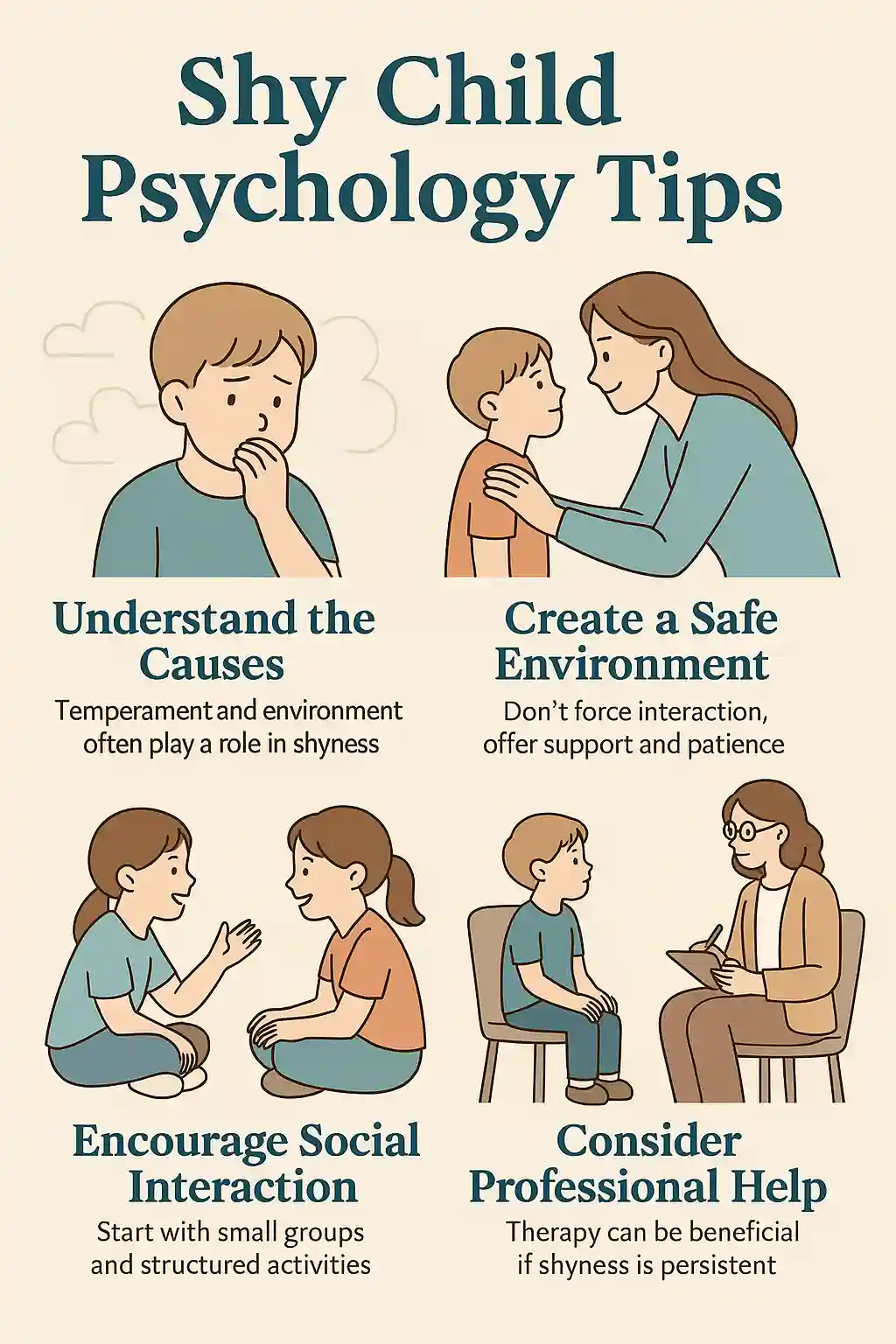
Some children are naturally talkative and bold, while others withdraw into themselves, avoiding eye contact and shrinking from group play. These quieter children often fall into a misunderstood category: they are shy, not disobedient. Parents, teachers, and caregivers need to distinguish between temporary hesitation and a more ingrained personality trait. In this article, we offer essential shy child psychology tips—not to change who they are, but to help them feel safe enough to grow.
Understanding a shy child means seeing the world through their eyes. For them, a classroom presentation or a birthday party might feel like an emotional tightrope. Instead of judging or pressuring them to “come out of their shell,” adults must provide tools, space, and reassurance. Only through this supportive environment can they slowly build confidence and find their voice.
Shy Child Psychology Tips for Everyday Support
Every child is born with a unique temperament. Research from the Child Mind Institute shows that shy children often display higher sensitivity to new environments, unpredictable sounds, and unfamiliar faces. They’re not defective or slow to develop—they’re simply more observant and cautious by nature.
Start with empathy. If your child seems reluctant to speak up in front of others, avoid pushing them. Instead, prepare them gently. Rehearse potential conversations. Role-play introducing themselves to a classmate. These small simulations can have a big impact.
Try setting up structured playdates at home, where the child feels safe. Encourage cooperative games, like puzzles or cooking, that don’t rely solely on verbal interaction. Gradually, their confidence will expand beyond the home.
The Role of Parenting in Social Development
Parental response can either validate or shame a child’s shyness. The American Psychological Association emphasizes the importance of emotional safety. When parents ridicule or express frustration with a child’s quietness, it only reinforces insecurity. On the contrary, when a parent accepts and respects their child’s temperament, the child feels seen and valued.
Avoid labeling your child in public. Phrases like “She’s just shy” may seem harmless, but they reinforce a negative self-image. Instead, say, “She likes to take her time to warm up.” This reframes the trait as a strength.
Also, make space for autonomy. Let your child order at a restaurant when they’re ready, or answer the door with you beside them. These micro-choices empower their growth.
How Schools Can Help Shy Children
Schools are not always built for the quiet child. Group projects, spontaneous speaking, and high-energy classrooms can overwhelm them. However, teachers can offer essential support with the right awareness.
Educators can seat shy children with steady, calm peers. They can also offer “safe spots” in the classroom where a student can retreat for a minute to regulate their emotions. Morning routines and visual schedules reduce uncertainty, which is often a trigger for anxiety in shy children.
Positive reinforcement is key. A child who raises their hand for the first time should be praised privately, not put on display. Avoid spotlighting their efforts in front of the entire class unless the child has asked for recognition.
When Shyness Hinders Daily Functioning
It’s important to differentiate between healthy shyness and something more serious. If your child avoids all social contact, refuses to speak in school, or expresses fear about everyday tasks, it might signal an underlying condition like social anxiety disorder or selective mutism.
According to the Mayo Clinic, persistent social withdrawal that interferes with learning or peer interaction may require professional evaluation. Watch for red flags: trouble making eye contact, physical complaints before school, or panic attacks in group settings.
Don’t panic—but don’t dismiss it either. Early intervention yields better outcomes.
Professional Help and Therapy Options
If a child’s shyness veers into distress or avoidance, therapy can help. Play therapy is a gentle, engaging method that allows children to express themselves non-verbally. Cognitive Behavioral Therapy (CBT), another effective tool, teaches children to recognize and reframe anxious thoughts.
In some cases, occupational therapists can assist with sensory processing issues that may contribute to shyness. These professionals help children become more comfortable with stimuli like noise, texture, or light—factors that can overwhelm sensitive temperaments.
You can explore providers through platforms like Psychology Today which allow you to search for child therapists by specialty and region.
Building Long-Term Social Confidence
Confidence doesn’t arrive overnight. Think of it as a garden: patience, nurturing, and consistency are required. Celebrate your child’s small wins—raising their hand, joining a group game, or introducing themselves. These actions, while small to you, are massive milestones for them.
Encourage hobbies that align with their comfort zones: art, music, books, or nature walks. These interests can serve as bridges to others with similar passions. Many shy children make deep, lasting friendships because they value trust and sincerity.
And remember: not all shy children want to be the center of attention. That’s okay. The goal isn’t to make them extroverts—it’s to help them feel comfortable being themselves, wherever they are.
Long-Term Outcomes for Shy Kids
Shy children are often misunderstood as being antisocial or lacking leadership skills. However, research shows that they are often more observant, thoughtful, and empathetic than their more outgoing peers.
In fact, a Harvard University study found that introverted traits in children can predict stronger impulse control and long-term decision-making skills. Many successful professionals—writers, engineers, therapists—identify as having been shy children.
The goal is not to force a transformation, but to support the evolution of their quiet strength.
Final Thoughts
Raising a shy child can sometimes feel like navigating without a map. But with awareness, patience, and encouragement, your child can grow to embrace their temperament while still developing critical social tools. These shy child psychology tips are designed not to “fix” your child, but to support them in becoming their fullest, truest self.
From home routines to therapy options, from teacher strategies to parental mindset, the path forward is filled with small but powerful steps. With time, your quiet child may just surprise you—not with noise, but with confidence that speaks volumes.
FAQ About Shy Child Psychology Tips
Q1: What causes a child to be persistently shy?
Q2: How can parents help a shy child open up?
Q3: When is shyness a concern?
Q4: Can schools support shy children?
Q5: Are professional treatments effective?
Q6: Will my child outgrow shyness?





